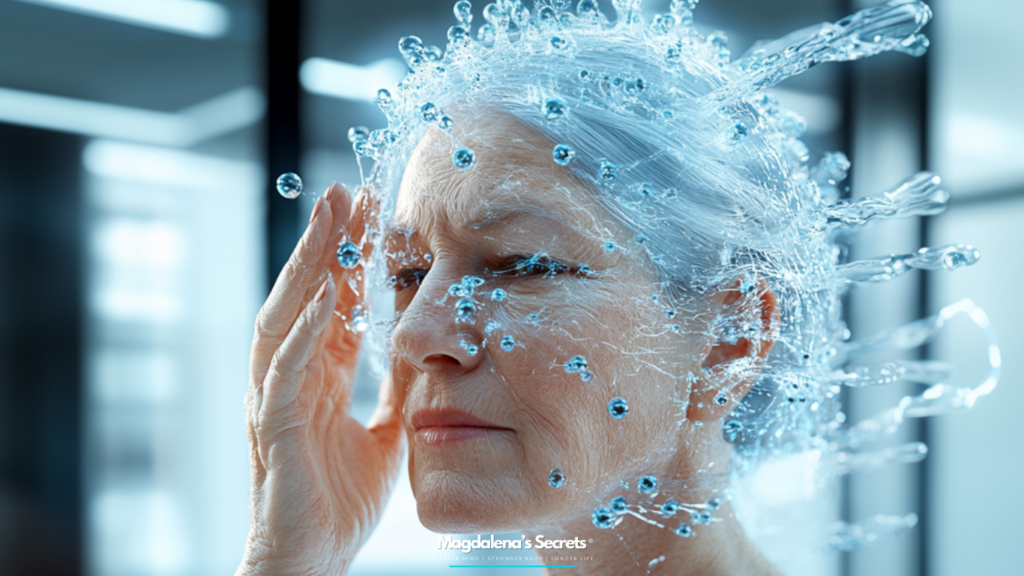Alzheimer’s disease affects two out of three women, yet for decades, the connection between female biology and brain health was largely ignored. Today, thanks to experts like Dr. Lisa Mosconi, neuroscientist and author of The XX Brain, we finally understand the powerful link between menopause and Alzheimer’s risk — and how hormonal shifts in midlife may lay the foundation years before symptoms appear.
The Brain on Menopause
Menopause is not just a reproductive transition — it’s a neurological event.
Estrogen, beyond its reproductive role, is essential for brain health. It supports:
- Glucose metabolism (brain energy)
- Synaptic function and plasticity
- Defense against oxidative stress
- Inflammation regulation
When estrogen drops during perimenopause and menopause, the brain loses fuel. PET scans show that women in this stage experience 15–20% lower brain energy than women in their reproductive years — and lower than men of the same age.
This energy decline (hypometabolism) is one of the earliest signs of increased Alzheimer’s risk.
Structural and Functional Changes in the Brain
Dr. Mosconi’s brain imaging studies reveal that women going through menopause show:
- Reduced gray matter in memory and cognition regions (hippocampus, prefrontal cortex)
- Increased amyloid plaques and tau tangles — the pathological hallmarks of Alzheimer’s
- Weaker brain connectivity compared to age-matched men
Not all women will develop Alzheimer’s — but menopause may be a critical window where brain vulnerabilities begin to surface, especially when paired with:
- Genetic risks (e.g., APOE4)
- Insulin resistance
- Chronic stress
- Poor sleep
- Inflammation
Why Women Are More Vulnerable
While lifestyle and genetics matter, Dr. Mosconi believes the missing piece is female biology.
Women live longer, yes — but that doesn’t explain the disproportionate Alzheimer’s risk. The real driver appears to be the sudden drop in estrogen, which triggers a cascade of changes in the brain.
Men, by contrast, lose testosterone gradually. And because some testosterone converts into estrogen in the male brain, their brain energy remains more stable over time.
What You Can Do: Proactive Strategies for Brain Health
The most empowering message from Dr. Mosconi’s work? Alzheimer’s is not inevitable. With early awareness and consistent habits, women can protect their brains:
• Get your hormones checked — Speak with a menopause-trained provider about whether hormone therapy could benefit your brain.
• Nourish your brain — Follow a Mediterranean-style diet rich in omega-3s, leafy greens, berries, olive oil, and polyphenols.
• Move your body — Regular exercise increases blood flow, supports memory, and boosts neuroplasticity.
• Prioritize deep sleep — Sleep clears brain toxins, including amyloid beta.
• Manage stress — Chronic cortisol damages brain tissue. Use breathwork, mindfulness, or therapy to protect your brain.
• Keep learning — Mental stimulation builds cognitive reserve and strengthens brain networks.
Final Thoughts: Midlife Is a Starting Line, Not the End
Menopause marks a biological turning point, especially for brain health. According to Dr. Lisa Mosconi:
“Menopause begins in the brain — not in the ovaries.”
Understanding this transition is not about fear — it’s about agency. With the right tools, women can protect their cognition, extend their vitality, and take the lead in their longevity journey.
Because knowing your brain is changing doesn’t mean you’re losing it — it means it’s time to take charge.




